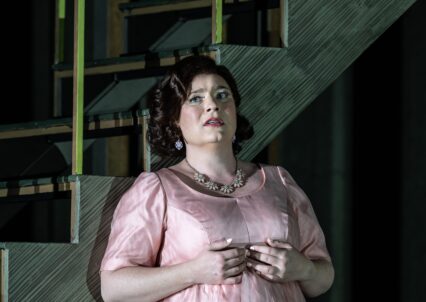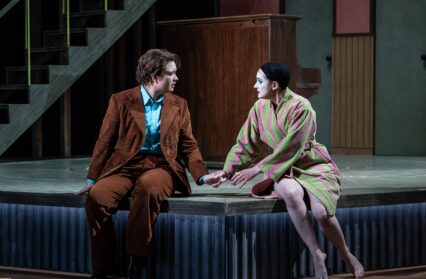David Truslove reflects on Natalya Romaniw’s performance in Ariadne auf Naxos at Garsington Opera.
No corpses, no love triangle, no conventional dramatic plot. Even in its final form of 1916 – an earlier version never enjoyed popular success – Richard Strauss’ Ariadne auf Naxos (along with his collaborator Hugo von Hofmannsthal) does not exactly follow any traditional format. Yet, considering its difficult conception, Ariadne holds a special place in the composer’s operatic canon. Less provocative than Salome; less heady than Der Rosenkavalier and less intimate than Capriccio: but arguably more attractive than any of those. Ariadne is often regarded as a problematic opera since it comprises an opera within an opera. To be precise, it’s a hybrid work in two parts: a farcical Molière-style Prologue followed by the Opera. The first confronts the trials of presenting a stage work to meet the demands of a wealthy patron and focuses on the figure of the Composer and the implicit dilemmas of the creative artist. The second draws on mythological Ariadne and her eventual passion for Bacchus.
This new production from director Bruno Ravella (already acclaimed for his Intermezzo and Rosenkavalier at Garsington) is the third in thirty years at the Buckinghamshire venue, one that has steadily built an enviable reputation for the opera of Strauss. Ravella and designer Giles Cadle opt for a relatively sparse staging – a single set that does for both Prologue and main opera, occupied by a staircase linking ground to first floor dressing rooms, the lower level for those participating in the masquerade (archetypes who depict the egos of the artists involved), the upper level for those involved in the serious opera (Ariadne and her attendants). A symbolic star is fastened to various doors in turn by whichever prima donna believes themselves the more significant at any given moment. Malcolm Rippeth’s atmospheric lighting creates all the necessary transformation from comedy to inner turmoil, a kind of Naxos of the mind. Meanwhile, costumes hint at mid-20th century; Polly Leech’s Composer and Young Woo Kim’s Bacchus both smartly suited and a plain pink dress for Natalya Romaniw, her followers in sea green.

Swansea-born Romaniw is already familiar to Garsington audiences; Tatyana (Eugene Onegin), Mařenka (The Bartered Bride) and, last year, the lead in Rusalka, now an outstanding and broken-hearted Ariadne, utterly believable in her move from despair to elation after her abandonment by Theseus and the discovery of her new love in Bacchus. She moulds her expressive soprano to every emotional situation, merging a rich lower register with a creamy, glowing upper voice, her ample power matched unquestionably by South Korean-born Young Woo Kim as Bacchus – whose tenor voice soars above the orchestra with an unflagging energy that make this notoriously demanding role sound comfortable. (Strauss reputedly did not like tenors – a prejudice seemingly embedded in this score.) As Harlequin, baritone Marcus Farnsworth delivers plenty of elegance in his Mozartian aria to Ariadne. No less persuasive is mezzo Polly Leech as the frustrated Composer, bringing warmth and ardour, and notably convincing in her rapturous exchange (‘Ein Augenblick ist wenig’) with Jennifer France’s Zerbinetta. The latter is a remarkable tour-de-force, coming into her own in her coloratura and crowned by a glittering ‘Grossmächtige Prinzessin!’
Elsewhere, John Graham-Hall’s flamboyant Dancing Master and William Dazeley’s outraged Music Master both splendidly catch the mayhem of the Prologue as they attempt to reconcile the needs of art and entertainment demanded by their patron. Completing the cast are the trio of nymphs (producing some superb ensemble singing) and the lively commedia dell’arte players, in Pierrot guise, vainly attempting to lift Ariadne’s mood as she bewails her loneliness.
In the pit, a polished Philharmonia respond brilliantly to Mark Wigglesworth, who generates a performance of subtlety and depth, drawing out the score’s delicacies and opulence in well-judged tempi and fully alert to balance above stage. No corpses here, or love triangle, but a fascinating insight into human behaviour and heated emotions consistent with any conventional opera. As one can expect, Romaniw is a commanding presence, A Welsh-Ukrainian gem amongst a sovereign cast.
Ariadne auf Naxos plays at Garsington Opera until July 21st. Ticket information can be found via the Garsington Opera website.










